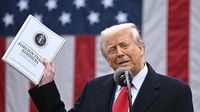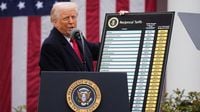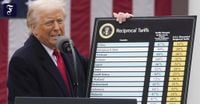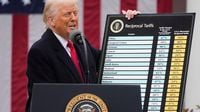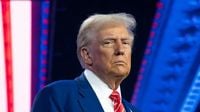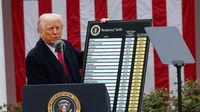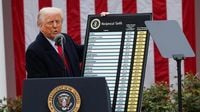On April 2, 2025, U.S. President Donald Trump announced sweeping new tariff measures during a ceremony in the Rose Garden of the White House, marking a significant shift in American trade policy. Dubbed the "Day of Liberation," Trump revealed plans for reciprocal tariffs that will impose a 20 percent tariff on imports from the European Union, alongside a staggering 34 percent tax on goods imported from China. Other countries will also face increased tariffs, with South Korea and Japan seeing rates of 25 percent and 24 percent, respectively, while Taiwan will incur a 32 percent levy.
Trump's announcement is seen as the largest tariff increase since the 1940s, a move that he claims will revive American industry and restore economic independence. "This day will go down in history as the day American industry was reborn, the day America reclaimed its destiny, and the day we began to make America rich again," Trump declared, asserting that the U.S. has been "plundered" by other nations for decades.
As part of the new trade policy, a universal tariff of 10 percent will apply to all imports into the United States starting April 5, 2025. This basic tariff will be supplemented by higher rates for countries with which the U.S. has significant trade deficits. Trump stated that the tariffs are a response to countries that impose their own tariffs and barriers to American goods, framing them as a necessary measure to level the playing field.
In addition to the tariffs on imports, Trump announced a 25 percent levy on all cars manufactured outside the United States, a move aimed at bolstering domestic automotive production. "We will impose a 25 percent tariff on all cars made outside the United States," Trump stated, emphasizing the need to protect American jobs and industries.
Critics of the new tariff regime warn that such aggressive measures could spark a trade war, particularly with the European Union, which is already preparing countermeasures. The EU has announced its own tariffs on U.S. goods worth €26 billion (approximately $28 billion) in response to Trump's steel and aluminum tariffs. European leaders have expressed concern that Trump's actions could lead to a significant economic downturn both in the U.S. and globally.
Trump's tariffs are expected to affect a wide range of products, with potential repercussions for consumers as companies may pass on the costs to shoppers. Economists warn that the tariffs could lead to increased prices and inflation, raising the cost of living for average American families. Some analysts predict that the tariffs could also result in job losses and a slowdown in production as companies adjust to the new trade landscape.
In his speech, Trump invoked the International Emergency Powers Act of 1977 to justify his unilateral action, stating that the long-standing trade deficits have created a national emergency. "Trade deficits are not just an economic issue; they are a national emergency," he asserted.
Reactions to Trump's announcement have been mixed. Canadian Prime Minister Mark Carney vowed to fight the tariffs with countermeasures, while European leaders have called for unity in response to what they see as unjustified and illegal actions. "For our American friends, today is not a day of liberation, but a day of bitterness," said Manfred Weber, President of the European People's Party in the European Parliament.
Trump's aggressive trade policy is reminiscent of his previous administration, where tariffs were also a cornerstone of his economic strategy. Since returning to office in January, Trump has already imposed tariffs on aluminum and steel imports and has targeted trade relationships with Canada and Mexico. The new measures are expected to escalate tensions further, with many countries preparing retaliatory tariffs.
As the tariffs begin to take effect, businesses and consumers alike are left to navigate the uncertain economic landscape. The potential for rising costs and retaliatory measures looms large, raising questions about the long-term implications of Trump's trade policies on the U.S. economy and its global trade relationships.
While Trump touts the tariffs as a means to restore American manufacturing and protect U.S. workers, critics argue that the approach may backfire, leading to economic instability and strained international relations. The coming weeks will likely reveal the true impact of these tariffs as both U.S. businesses and foreign trade partners respond to the new economic reality.
